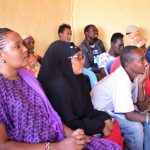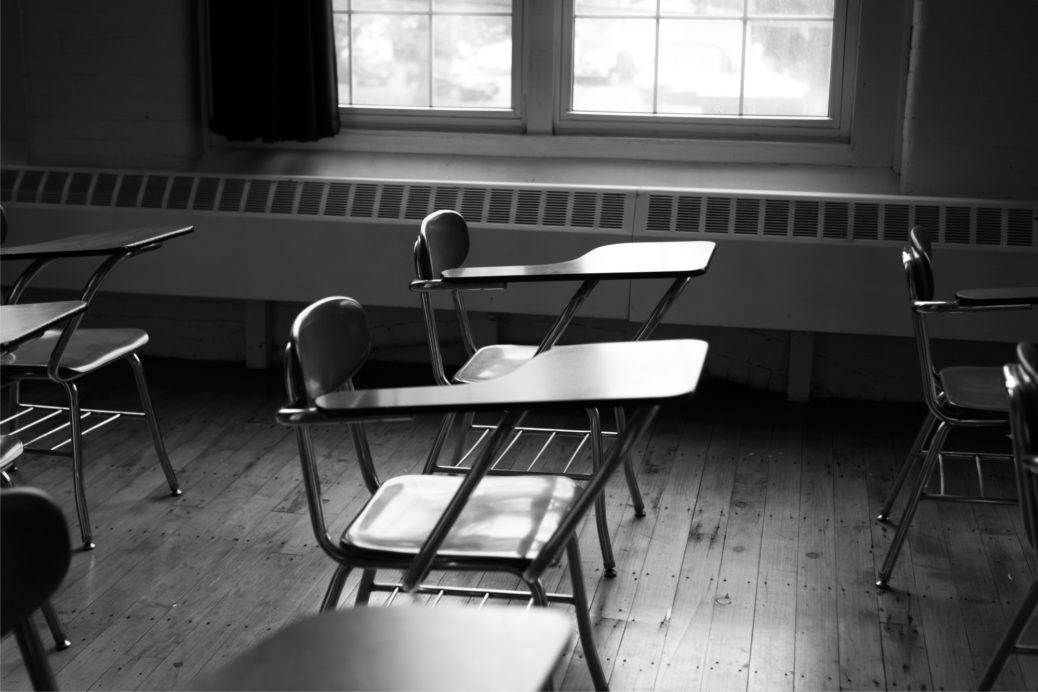This blog was originally published on the TheAfricaReport on May 11, 2020.

A pupil sits inside a classroom ahead of the primary school final national examinations at Kiboro Primary school along Juja road in Nairobi, Kenya October 31, 2017. REUTERS/Thomas Mukoya
The International Finance Corporation (IFC) announces a shift in education strategy that acknowledges the voices of the most marginalized.
In the 1970s-1990S my parents amassed quite the record collection. Amongst them were records by Remmy Ongala, a Congolese musician whose hits reverberated across East Africa in the late 1980s and early 1990s.
His popular songs painted pictures of the fatalism and melancholy of that period, a significant patch of which was due to the structural adjustment policies that had swept the region. “Mnyonge hana haki”,which means that the poor and disenfranchised have no rights, was one of the songs that captured the spirit of the time.
In it Ongala juxtaposes the daily struggles of the marginalized against a lively groove, very much reflective of the discordant lives that we inhabit even today.
Meet Imani
Recently, Ongala’s truth came to me once again through Imani. I met Imani* (not her real name) in February 2020 as she gently narrated to us how her son had been electrocuted while at school last September in 2019.
Imani lives in Mukuru Kwa Njenga, a low income settlement in Nairobi. “Mukuru” means dumping site in colloquial Kikuyu vernacular.
Her son’s school, situated a few metres from her home, is one in a commercial chain of over 250 schools that began operating in Kenya in 2009 that have since received $13.5m from the World Bank’s private finance arm, the International Finance Corporation (IFC) and over $100m via other investors.
“Research specifically into Bridge in Kenya and Uganda revealed that children being expelled from school due to non-payment of school fees; a toxic work environment; flouting of national laws and regulations; and varied compromises on quality.”
This school is known as Bridge International Academies (Bridge), an entity that is now described as being the largest chain of low cost private schools across Africa, mainly targeting parents who earn less than $2 a day.
According to Imani, Bridge offered her no recourse or redress. No one at the school deemed it necessary to even communicate to her that her son had been injured. When confronted, the head teacher told her that she must carry her own burden.
The police in turn, brusquely turned her away. While considering her options, Imani’s father passed away. His last words to her on the matter reminiscent of Ongala’s refrain – “mnyonge hana haki” he said, asking her rhetorically, “what comes of fighting the rich?”
Civil society takes action
Since 2015, civil society has raised concerns about commercial chains, highlighting the ramifications of an approach that incentivises proliferation and profit over human rights.
Research specifically into Bridge in Kenya and Uganda revealed that children being expelled from school due to non-payment of school fees; a toxic work environment; flouting of national laws and regulations; and varied compromises on quality.
“The journey to accountability is often long, fraught with many hurdles especially in our context.”
These grievances were further highlighted by several complaints made by current and former teachers and parents to the IFC via the Compliance Advisor Ombudsman (CAO). The CAO is an independent accountability mechanism for the International Finance Corporation (IFC), which addresses complaints by communities or individuals negatively affected by IFC projects.
The East African Centre for Human Rights (EACHRights) continues to provide technical and other support to these community members as they navigate complaint process.
Imani also approached us to assist, and EACHRights stepped in to provide her with technical support especially in navigating the CAO complaint process, in exchanges with the Kenyan Ministry of Education and providing legal support where necessary.
The journey to accountability is often long, fraught with many hurdles especially in our context. Civil society support to local communities is therefore crucial and citizens, such as Imani, should continue being encouraged and equipped to engage with accountability mechanisms in order to claim and secure their rights.
To this end, the Accountability Console is a useful resource that provides citizens, civil society and other stakeholders with information on all Independent Accountability Mechanisms (IAM).
“Freeze on investments”
On 1 May 2020, the IFC announced a freeze on investments in private for-profit schools (K-12 primary and secondary) including a freeze on “direct investments, advisory work, and indirect investments resulting from new investments in private equity funds”.
For Imani, this is a major step forward in addressing her plight as it means future investments in schools like Bridge are essentially being rethought.
This is a departure from the IFC’s previous approach in which they posited that the engagement of for-profit providers in education contributed to their poverty alleviation goals. It was with this thinking in mind that IFC invested in Bridge.
Analyses of the IFCs K-12 (basic education) investment portfolio from 1996 to 2015,however, showed that these investments yielded little to no benefit for the poor and were also found to have had negative impacts on local communities.
A freeze on future investments is therefore timely and welcome, inevitably contributing to mitigating any further entrenchment of inequality and segregation.
Our leaders could do much to emulate the Honourable Maxine Waters, the Chairwoman of the House Financial Services Committee, who played a major role in securing this commitment, and has remained a consistent champion of transparency, accountability and human rights where large corporations and investors are concerned. Waters first challenged the Bank in 2019 and that charge also led us to where we are today.
First step accomplished, now what?
What comes next is up for discussion. The IFC states it will now be requesting an independent evaluation of their investments and engaging in an “inclusive and transparent public consultation process…. to determine whether there are any exceptional circumstances under which future IFC investments could be made without impacting negatively on poverty, inequality, the right to education or the provision of public education.”
It is difficult to say now what these consultations will produce. Nonetheless, strengthening accountability and prioritising public education will need to be a major focus, especially given the continuing impact of the COVID-19 crisis on the right to education.
Others should heed the example
Other education investors such as DFID/ CDC and Proparco, who invest public monies, as well as private investors such as Novastar Ventures and Omyidar should take note and follow suit. Our governments in turn must offer greater scrutiny and vigilance: the current pandemic must not result in our Ministries of Education being railroaded into adopting commercial or statutory quick fixes that place the right to education in jeopardy.
The Abidjan Principles on the Right to Education (2019) offer some guidance around monitoring the conduct of IFIs and international organisations, and evaluating their impact on national education ecosystems (see Guiding Principles 22, 26, 38, 63, and Overarching Principle 6).
Bottom line: As the IFC deliberates its next step and opens up avenues of engagement on the matter, we urge them to continue addressing the evident challenges within public education systems and the weaknesses in the regulatory environment, particularly where low cost private schools are concerned.
Doing so will deter future human rights abuses and will ultimately uphold the right to education for all, especially the most vulnerable and the most marginalized children.
Imani’s story is also one of collaboration, in which organisations such as Accountability Counsel, SOMO , Oxfam International, GI-ESCR, ourselves and others, have stepped forward to assist local communities articulate their rights and raise their grievances against the IFIs, private corporations, and investors that they normally wouldn’t have access to.
Without them, Imani’s voice would not have resonated as loudly, after all “wanyonge wana haki” – the poor, as everyone else, have rights.





